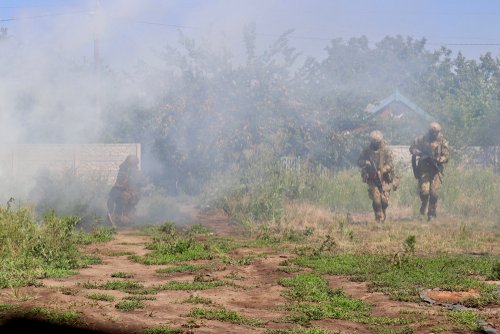Belgium (Brussels Morning Newspaper) Ukraine’s 1-month-old offensive against Russian occupation forces “is not meeting expectations on any front.” That is the striking observation that the US news channel CNN recorded in late June from senior Western officials. In recent weeks, the Ukrainian army captured a few villages and around 130 km² of territory over a frontline of as much as 2,500 km. The Russian defenses do not appear to be easily breached due to the massive presence of landmines, well-entrenched troops, and Russian air superiority.
According to calculations by a Swiss newspaper, 13 percent of the tanks and armored vehicles supplied by NATO countries have already been destroyed. Of the 113 American Bradley armored vehicles delivered, 22 percent are said to be disabled. British intelligence speaks of large losses in both camps. In short, it should not be said too loudly, but the long-announced Ukrainian offensive may well end in failure. A failure does not fit the playbook because it could affect Western readiness for massive military support. To make it worse. To the east of the front line, Russian forces would even make small gains in territory. That things are not going as desired can also be concluded from a statement by Mark Milley, chairman of the Joint Chiefs of Staff: “It’s going to be very long, and it’s going to be very, very bloody. And no one should have any illusions about any of that.”
The mentality as outlined by Milley is reminiscent of World War I: a few miles of territorial gain is worth thousands of lives. Politicians and generals write the script, and the soldiers in the trenches provide the cannon fodder fueled by the illusion of a “heroic” military victory that, in reality, bogs down in a months-long stalemate. Nor can it be ruled out that Russian forces not only parry the Ukrainian offensive but gain additional ground in a counteroffensive.
That would put Ukraine in an even more disadvantageous (negotiating) position. A third possibility is for Ukrainian forces to liberate a significant portion or even the entire territory, President Zelensky’s official strategic goal. However, what appears to be a tempting end result could degenerate into a nuclear nightmare. The loss of Crimea opens the door for the deployment of Russian tactical nuclear weapons. Moreover, a Russian defeat of that magnitude could be destabilizing which is also not an attractive option for a nuclear weapons power. Prigozhin’s uprising last month is symptomatic of how the war may cause political turmoil in Russia.
In other words, the military logic of this war does not offer attractive outcomes. The longer the war in Ukraine continues the greater the suffering and damage to the country. It is doubtful that generous military aid to save the country by helping to destroy it will be followed by an equally generous flow of billions to rebuild the country.
Nevertheless, calls for a cease-fire and negotiations are surrounded by taboos. Proponents are accused of playing into Putin’s hands. Others express skepticism that Putin does not want peace or is unreliable. There may be a ground of truth in that, but there is no alternative given the military scenarios just outlined. And there is precedent. By the end of March 2022, under Turkish mediation, Kyiv and Moscow were well advanced in concluding a framework agreement that, however, did not receive support from London and Washington, which preferred the military option.
A growing understanding that the war is hopeless could create the diplomatic space for a cease-fire and negotiations. Agreeing on a lasting peace deal will take time, but time can also generate reasonableness and political will if only the weapons remain silent. The Good Friday Agreement which laid the foundation for peace in Northern Ireland came after many years of hopeless violence.
There are many possible ingredients for a package deal. Moscow might find it an attractive option, in exchange for a neutral Ukraine with international security guarantees, to share sovereignty over Crimea and return to the 2015 Minsk Accords. These provided autonomy for the Donbass regions where the 2014 war began between Kyiv-backed nationalists and Russian minority nationalists supported by Moscow. Borders need not be sacred if an honorable agreement can be reached that gains the consent of all warring parties. Kosovo was also separated from Serbia after an uprising by Albanian nationalists.
Ukraine could be helped across the bridge with an (economic) Marshall Plan and a partial restoration of sovereignty over the territory that probably cannot be achieved through military means anyway. There is a growing consensus in the West that full Ukrainian sovereignty over Crimea is no longer feasible. A cease-fire can also generate parallel diplomatic avenues for the geopolitical dimension of this war as part of a major negotiating package to win over Russia. I am thinking of an inclusive security system, agreement on confidence-building measures, restoration of the arms control regime agreements on demilitarized and/or nuclear-free zones, economic agreements, etc.
With the necessary diplomatic creativity, a new future for a prosperous Ukraine in a peaceful Europe can be built on the ruins of a horrific war. Those who raise objections about deals with authoritarian regimes I can only confront with the observation that not war and confrontation, but peace contributes to beneficial democratic developments.




